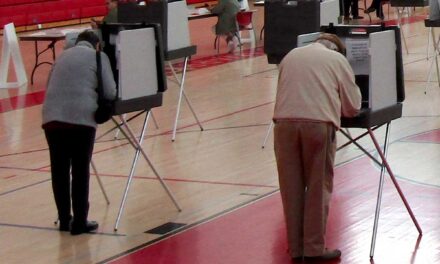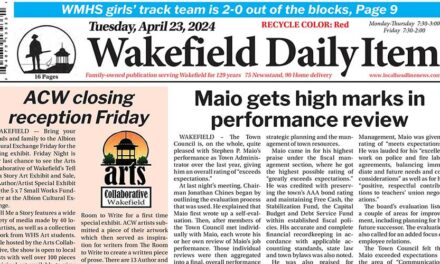Published in the April 23, 2021 edition.
WAKEFIELD — To help inform voters ahead of the April 27 Town Election, the Daily Item posed two questions to the candidates running for School Committee and two questions to those running for Town Council. We have been publishing their responses this week.
Today, we present the final installment, featuring responses to our second question to School Committee candidates. There are three separate School Committee races this year.
Ami Ruehrwein Wall and Gregory Liakos are running for a single one-year seat on the School Committee. Dawn Millward and Kevin Piskadlo are vying for one two-year seat. Stephen Ingalls and Amy Leeman are running unopposed to fill two three-year terms.
Question: To what degree have Wakefield students experienced learning-loss as a result of the pandemic and what can the School Committee do to help the schools compensate for that loss?
(One-year term)
AMI RUEHRWEIN WALL: Our teachers have done a tremendous job by not only providing a high level education to our children, but also ensuring students remain engaged during the pandemic. There is no doubt that this was a difficult task, and they should be commended for their efforts. It’s important to understand that the impacts of the pandemic on all levels of education has varied greatly from student to student, and with their return to the classroom on a full-time basis, we’ll need to continue to lean on our teachers while they assess where their students are at educationally.
Moving forward, the school committee needs to engage with our teachers, listen to their ideas, and work in partnership with them as we strive to get back on an educational track that leads to future success. This will be a long term approach that must also support mental health services for our students and further addresses food insecurity issues at home, which will foster an environment of learning. Additionally, across the country, high school dropout rates are expected to increase due to the pandemic. We must take action now by identifying those students at risk of never returning, and strengthening our early intervention strategies to prevent a dropout spike from occurring.
GREGORY LIAKOS: The School Committee must first hear a detailed assessment from our educators before making any decisions about how to respond to the impact of the COVID-19 pandemic on learning. However, the education budget we will put before Town Meeting next month begins to address this by assuring the schools have the resources they need to bring students back safely to classrooms and reopen fully in the fall. We will likely need to hire tutors to help students recover reading and/or math knowledge and skills. We should expand opportunities for learning in and through the arts, which should be an essential part of every student’s school day.
Beyond that, we must prioritize new funding from the state and federal governments on supporting students with disabilities, those learning English as a second language, students struggling with mental health and social and emotional challenges, and children living in poverty. I’d like to engage the broader Wakefield community in a conversation around how to help those students recover what they may have lost from the pandemic: not just academic content, but the relationships and experiences that make our schools great places to learn.
(Two-year term)
DAWN MILLWARD: I do not think we will truly understand the overall full significance of the academic, social and emotional impacts that the Wakefield students have experienced due to the pandemic until we are all back in person full time at school. When the pandemic started one of my main concerns as a parent and special education teacher was how are we going to ensure that the students receive a quality education and continue to make gains academically, socially, and emotionally. As a teacher, I was asked to do something that was different, with little time to prepare and master my trade. As students, we asked them to do the same thing. While some teachers may have adjusted easier to the changes than others, the same can be said for students.
Some students have demonstrated growth during this time period, while others have not. I myself, as a parent and teacher, have referred to learning-loss quite a bit. However, it is important to understand that learning loss does not simply imply forgetting information, it is looking at where students should be within the grade level curriculum. As educators, it is our job to assess, evaluate, and develop a comprehensive plan to close the academic gap.
As with any initiative there will always be costs related, which in turn impacts the budget. During the budget meetings I was surprised to learn that there were no additional funds allocated for interventions or social/emotional learning. While taking notes during the meeting I wrote “nothing explicit about SEL and interventions – we need to plan for what is known and what is in front of us.” I think it’s fair to say we know this has had an impact on our students and we should be proactive in our planning rather than reactive. In a recent survey that the Student Youth Council gave to help determine academic, social and overall mental health of high school students the answers are quite worrisome. Over 600 students participated in the survey, over 65% of students indicated learning less or much less learning prior to the pandemic while in school, 70% indicated that their stress levels or anxiety are slightly or much higher prior to the pandemic, and a minority or 45% answered that they felt tense, nervous or worried for over fourteen consecutive days. As a School Committee member I would have pursued and questioned this topic more. As hard as teachers and students have worked, there is going to be a need for funding on addressing students’ needs. It is important that the funding is available to address those needs.
I think moving forward we also have to consider scheduling and how being creative can support all student learning needs. The idea of having a team time can be utilized in so many different ways at the middle school level. At the elementary level blocks could also be created to work in areas of need while also challenging others. Starting next year schools will be implementing dyslexia screenings. It will be important that schools have the means to provide early intervention and supports to identified students. In many cases if early identification is determined and remediated the overall long term cost is much less. If the pandemic has taught us anything, is that students are resilient and can adapt to changes. As a School Committee member I would take this opportunity to start initiating forward thinking learning styles while also addressing the diversity, equity and inclusion of all learners.
KEVIN PISKADLO: All too often, meaningful change in education often takes place at a glacial pace. The pandemic, however, has challenged all of us who are in the classroom to re-think our work and to adapt our teaching strategies to complement the shift from all in-person learning to remote and hybrid classrooms. Though this was not an easy process, and there were bumps along the way, our dedicated teachers and support staff throughout the system deserve a lot of recognition and credit for how they nimbly transitioned to these new modalities and continued to educate our students. They did this while dealing with the pandemic in their own lives. Even though the delivery model certainly differed, we know that students continued to learn each and every day. In fact, some learners thrived.
It is too early to know what impact the pandemic will have on our students in terms of their development – cognitive, interpersonal, and intrapersonal. What we do know is that this is an international phenomenon and educators across the globe, from preschool to graduate school, will need to critically look at their work, adjust their curricula, and continue to focus on student wellbeing and achievement. In doing so, however, it is important not to stigmatize an entire generation of learners. Utilizing an asset-based lens, professional educators, with the support of system leaders, can create the educational environments needed to support this achievement. As a professional educator myself, these are the very things my colleagues and I are focusing a lot of our work on.
The role of the School Committee in this important endeavor is to support our administrators and educators by providing the structures and resources necessary for it to continue. To that end, the School Committee can craft policies that continue to focus on the health and safety of students, faculty, and staff; provide appropriate supplies and PPE; fund necessary academic support programs, mental health resources, and teacher professional development and planning time; and set a positive tone for the district that focuses on what has been gained rather than what has been lost.
Over the past year, I have worked each day to organize and implement the delivery of in-person living and learning opportunities for my students at Stonehill and supported their mental health needs, both directly as their Dean and indirectly through my oversight of Stonehill’s Counseling Services Office. I have also taught in person, remote, and hybrid. This experience, coupled with the two terms I previously spent on the School Committee, will allow me to jump right in and contribute on April 28 on this very important issue.
(Three-year term)
AMY LEEMAN: Wakefield Public Schools are now contending with the fact that students came through the remote/hybrid period with a degree of learning loss and now must strategize how to return them to the right baseline in an equitable way. In order to efficiently identify what interventions to implement to recover, parents, teachers and administration need to collect data to know where our students are now.
Every possible intervention should be on the table. Forthcoming federal funding could be used for summer learning, specialized small group instruction, intervention services, and after-school tutoring. The School Committee will play an important role in overseeing the deployment of federal funding for Wakefield. The School Committee could also support a modified version of MCAS testing this spring to assess where individual student and grade-level learning loss gaps exist in a year where The Department of Elementary and Secondary Education (DESE) has stated that MCAS results will not count against a district or school and no schools will be named “underperforming.”
STEPHEN THOMAS INGALLS: While it is true that all students in the district have received less in person teacher time and have not touched upon topics that they would have normally, the term of “Learning Loss” is not going to mean the same for every student. All students learn differently and have had different experiences during remote and hybrid learning times. It will be necessary to first assess where our students are in terms of academic learning and social and emotional strengths and measure the delta between that space and where they should be for their grade level. We can then work to find which resources will be needed to help students cross that divide.
This pandemic has shone a light on the individualistic nature of our learners, and we need an individual response. It is my hope that, in working with members of our community and our District, the School Committee can play a role in understanding what worked and what was challenging in the remote and hybrid models for different types of learners, and help support the District to move forward to integrate the positives and mitigate the challenges.
The mechanisms to help our students address gaps, new and ongoing needs will consist of both existing measures, such as tutoring, WIN’s (What I Need) teams, Summer and After School education opportunities. Our educators will play a crucial role in these remediations and a teams approach may work best to find where we are seeing our best returns. We can also leverage technology platforms that were found to be successful for our students while learning remotely.
It is important to note that we will not be the only district struggling with this question and so it will be important to work with others and collaborate to find what is working best for similarly structured communities. This would assist in setting benchmarks for both the financial burden of additional resources and to help maintain realistic expectations for learner progression.




